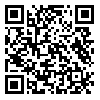BibTeX | RIS | EndNote | Medlars | ProCite | Reference Manager | RefWorks
Send citation to:
URL: http://jdisabilstud.org/article-1-3240-en.html
2- Assistant Professor, Department of Islamic Teachings, Shahrood Branch, Islamic Azad University, Shahrood, Iran
3- Assistant Professor, Department of Physical Education, Shahrood Branch, Islamic Azad University, Shahrood, Iran
Abstract
Background & Objectives: Social anxiety is one of the mental disorders that many people face in different societies. This study aimed to determine the effectiveness of shame management training on social anxiety and social skills of adolescents with social anxiety disorder.
Methods: The current research was quasi–experimental and employed a pretest–posttest design with a control group. The statistical population of this research included all adolescents with social anxiety disorder living in Tehran City, Iran, in 2022. Of them, 30 adolescent girls aged 12 to 18 referred to the Asre Zendegi (living era) Center were selected as a sample using available sampling. They were randomly assigned to the experimental (15 people) and control (15 people) groups. The implementation method was such that after selecting the people of the sample group and before starting the treatment program, the Social Anxiety Questionnaire (Leibowitz et al., 1987) and Social Skills Questionnaire (Matson et al., 1983) were distributed between both groups. After that, shame management training was implemented in the experimental group (in eight 90–minute sessions, once a week), and the control group was not subjected to any treatment program. In the end, the posttest was done again for both groups. Also, after the end of the research, the treatment program was implemented in the control group to maintain the ethical standards in the study. The inclusion criteria include female adolescents being 12 to 18 years old, suffering from social anxiety disorder, and not participating in other therapeutic interventions at the same time. The exclusion criteria include an absence of more than three sessions from the intervention and a lack of compliance with group therapy rules. Data analysis was carried out in two parts: descriptive and inferential statistics. At the level of descriptive statistics, frequency, percentage, mean, and standard deviation were calculated. At the level of inferential statistics, multivariate covariance analysis was employed. Data analysis was done in SPSS software version 24, and the significance level of the tests was considered to be 0.05.
Results: The research findings showed that the effect of shame management training on social anxiety and social skills of adolescents with social anxiety disorder was significant (p<0.001). The analysis of covariance for the variables of anxiety and social skills revealed that after removing the effect of the pretest, there were significant differences (p<0.001) between two study groups in performance anxiety (p<0.001), social situations anxiety (p<0.001), general social anxiety (p<0.001), suitable social skills (p=0.006), dissocial behaviors (p=0.004), aggression and impulsive behaviors (p=0.003), domination / overconfidence (p=0.002), relation to peers (p=0.002), and social skills (total) (p<0.001).
Conclusion: One of the reasons that shame management training can improve the social skills of teenagers with social anxiety disorder is to increase their self–confidence and reduce shame and discomfort in facing others. Due to embarrassment and discomfort, these people may not want to behave socially or be unable to deal with others. With shame management training, teenagers receive various trainings that help them reduce their shame and discomfort in facing others. In addition, by practicing different social skills, teenagers will be able to experience a significant improvement in these skills, which will increase self–confidence and reduce social anxiety. Therefore, it can be said that this type of intervention can provide tools and techniques to deal with people with anxiety–provoking social situations as well as opportunities to practice social skills in a supportive environment.
| Rights and permissions | |
 |
This work is licensed under a Creative Commons Attribution-NonCommercial 4.0 International License. |



